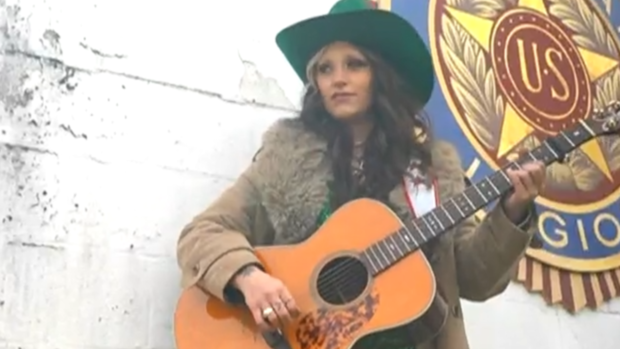Singer Sierra Ferrell talks roving past and remarkable rise
Sierra Ferrell is a singer and songwriter with a fast-rising career, but her road to success has been an unconventional one — hitchhiking, train hopping and busking her way across the country for years before she landed a record deal.
The daughter of a single mom, Ferrell grew up poor in West Virginia, but says she has been singing since she could talk.
"I was a pretty annoying child," Ferrell said with a laugh.
When she was in her early 20s, as the opioid epidemic was spreading, Ferrell said she fled.
"I left because I feel like I've always had this wild side to me. And I knew that if I stayed there, I probably wouldn't still be alive," she said. "And so, I left and searched for maybe myself, maybe to find out what else there is, maybe even a reason to live."
Ferrell, along with a friend, started hitchhiking.
"The very first person that picked us up, he pulled out this knife that was in a sheath and he handed it to me, and he is like, 'Take this with you. You're going to need it,'" Ferrell recalled.
When she wasn't hitching rides, Ferrell, now 35, was hopping trains.
"It felt like I was an outlaw," she said. "I felt more free."
For years, Ferrell traveled, busking on the street to get by and relying on the kindness of strangers.
"And what's also crazy about that scenario is it's usually the people who have less who give you something because they know what it's like," Ferrell said. "A lot of the people who are travelers, they're usually running from something."
Ferrell admitted she, too, was running, from addiction and past experiences. But she says they eventually caught up with her.
It was during a trip home to West Virginia when Ferrell says she relapsed with a friend, saying that "I did die."
"I just like collapsed on the floor," she said. "And I looked up, and like, Chris was like smacking me in the face. And he is like, 'Sierra, wake up.' And it was like time didn't exist anymore."
Ferrell said it was an out-of-body experience. She saw a "pin of light" above her that appeared to get larger. Then, she said, her feelings of fear disappeared.
"And the only thing I knew that existed was pure bliss," she said. "And I saw these figures in a circle, and they knew who I was. And they're just like, 'Come, be with us. Come to us. It's time. Come home.'"
Finally tired of traveling, Ferrell settled in Nashville and started therapy.
"Taking accountability is huge," she said. "Miraculously, things in your life just start to happen better."
Her life began to change once in Nashville. Ferrell played Honky Tonk Tuesday Nights at American Legion Post 82, and a buzz started to build, leading to a record deal and her debut album.

"It's kind of funny how the attention comes because it's like, nothing, nothing, nothing. All at once," she said.
Ferrell's new album, "Trail of Flowers," displays the wisdom of a woman who has lived by her wits.
"I needed to get that wildness out," said Ferrell, who is touring alongside the Avett Brothers and Zach Bryan this summer. "It kind of really grounded me."
Ferrell said all of these lived experiences — both good and bad — inevitably make their way into her music.
"You got to go through the sadness to appreciate the joy and to know what the joy can give you," she said.
- In:
- Opioid Epidemic
- Entertainment

Anthony Mason is senior culture and senior national correspondent for CBS News. He has been a frequent contributor to "CBS Sunday Morning," and is the former co-host for "CBS This Morning: Saturday" and "CBS This Morning."
Twitter InstagramDisclaimer: The copyright of this article belongs to the original author. Reposting this article is solely for the purpose of information dissemination and does not constitute any investment advice. If there is any infringement, please contact us immediately. We will make corrections or deletions as necessary. Thank you.







